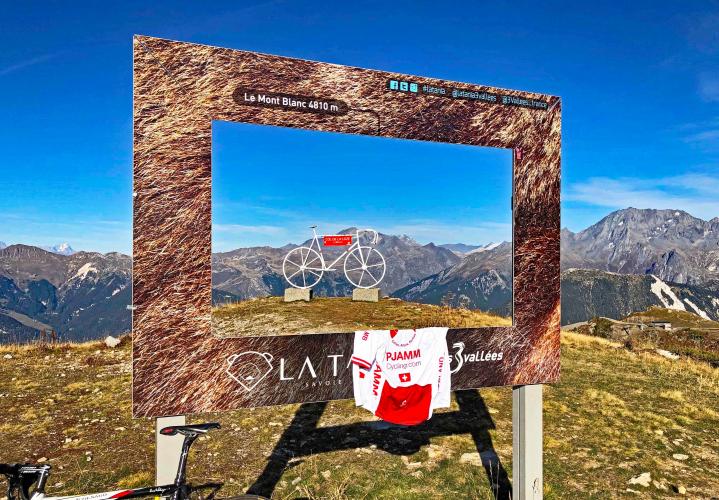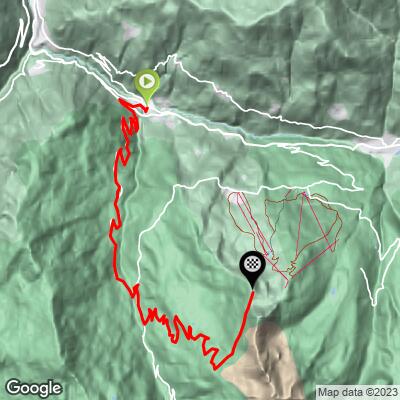![]()
Cycling Col de la Loze from Meribel
Ride 22 kilometers (13.7 miles) gaining 1,690 meters (5,544’) at 7.7% average grade.
Col de la Loze from Meribel is the #1 ranked road bike climb in all of France (see France Top 10)
![]()
While the climb is a serious challenge from start to finish, it is the final 7 kilometers on the bike path which are the most difficult averaging 8.9% average grade. The steepest 500 meters average 13.3% and begin on the bike path at kilometer 17.7. When PJAMM did this climb on July 2, 2023 we noted our Garmin read 20% on 2 spots over the last few kilometers.
![]()
The climb begins in Brides-les-Bains (Olympic Village for the 1992 Winter Olympics).
![]()
Road markers each kilometer.
Photo: Starting km marker.
![]()
First couple kilometers of the climb.
![]()
Middle portion of the climb.
![]()
Roundabout at kilometer 7
![]()
Transition to the bike path at kilometer 15.7
![]()
The final kilometers average 9.2% and there are 3 kilometers that average 11-12%.
![]()
The final kilometer marker is located at the Vallee de Courchevel ski resort.
![]()
Finish at the ski resort.
![]()
Summit in the cycling season . . .
![]()
. . . summit in ski season.
![]()
We ride to the top of the mountain . . . no trams for us!
Before heading to France on your cycling adventure, be sure to rely on our list of Things to Bring on a Cycling Trip, and use our interactive checklist to ensure you don't forget anything.
TOUR DE FRANCE
![]()
2023 Tour de France - Stage 17 - Col de la Loze
Photo: letour.fr
On September 16, 2020 (previously scheduled for July 15), Stage 17 (Grenoble - Col de La Loze) the Tour de France featured for the first time this mountain climb. Christian Prudhomme’s Comments:
“Only a great champion will be able to win at the Col de la Loze! The stage profile invites the favourites of the Tour to be audacious. They don’t yet know the road that will take them on that day to the Col de la Madeleine and have no idea of what to expect once in the resort of Méribel. They’ll still have an extra 7 irregular kilometres to climb with several passages at over 20%.”
![]()
Colombia’s Miguel Ängel López won stage 17 feeling at home above 2,000 meters (his home in Colombia is at 2,500 meters). Race leader Primož Roglič extended his advantage while López moved into podium position at number 3.
![]()
Miguel Ángel López (2023 Colombia national champion; 2016 Tour de Suisse champion)
Photo: Astana official website.
![]()
2023 TdF - Stage 17
Col de la Loze has been featured as an HC mountain top finish in the 2017 and 2023 Tour de France.
© Climb name | Elevation (meters) | Times highest point of TdF (as of 2022) | Mountain Range | Times Featured in Tour de France | Most recent | First included |
Cime de la Bonette | 2,802m | 4 | Alps | 4 | 2008 | 1962 |
Col de l'Iseran | 2,770m | 8 | Alps | 8 | 2019 | 1938 |
Col Agnel | 2,744m | 1 | Alps | 2 | 2011 | 2008 |
Col du Galibier | 2,642m | 50 | Alps | 63 | 2022 | 1911 |
Col du Granon | 2,413m | 0 | Alps | 2 | 2022 | 1986 |
Port d'Envalira | 2,407m | 3 | Pyrenees | 10 | 2021 | 1964 |
Col de la Lombarde | 2,350m | 0 |
|
| 2008 | 2008 |
Col d'Izoard | 2,360m | 9 | Alps | 36 | 2019 | 1922 |
Col de la Cayolle | 2,326m | 0 | Alps | 3 | 1973 | 1950 |
Col de la Loze | 2,304m | 0 | Alps | 1 | 2023 | 2020 © |
Above is a list of the highest all-time finishes of the Tour de France.
The below Climb Summary was written by Ties Arts, Netherlands (photographs by Ard Oostra, Switzerland):
The cycling world is dynamic and so popular these days. In Les Trois Valles in France there is an ambitious plan. A plan to connect les Trois Vallees (which includes the well known ski destinations of Courchevel, Meribel, and Les Menuires) not only via skis but also with visitors on two wheels! The purpose is to make this very popular winter site more attractive during the rest of the seasons for cyclists.
The first step is connecting Meribel with Courchavel. And so Col de la Loze was born, with 2304m altitude. Col de la Loze is the third highest col in Savoie area (after the well know Col de I’Iseran (2770m) and the Galibier (2642m).
![]()
Nothing beats the Col de L’Iseran for altitude, but . . .
![]()
Col du Galibier is not far behind.
Col de la Loze already existed before this plan, although the last 6 kilometers from both the east and west side were not paved. These have been paved recently and are accessible only to cyclists - a true cyclist’s heaven!!
![]()
There is an excellent 51 kilometer loop beginning and ending in Brides les Bains which should be done counter-clockwise to approach the col from the north. This approach is the most difficult one, at 22 kilometers gaining 1,690 meters at 7.7% average grade (15% steepest ½ kilometer; 12.3% steepest 1 kilometer).
This is a beast of a climb with many nice hairpins saving the best for last: 8.2 kilometers at 9% after passing Meribel.
SEPTEMBER 2019 RIDE REPORT AND SCENIC PHOTOS FROM PJAMM’S ARD OOSTRA:
![]()
Ard
Last Monday late afternoon of September 2019
Clear skies, 23 to 12C, light west wind
22 km climb to Méribel ski resort
Initial impression: Winding roads (32 hairpins in total) through forests, passing some villages. Wide roads, never steep, but with a fair amount of traffic for the first portion of the climb.
![]()
First segment is through villages and . . .
![]()
. . . forest . . and . . .
![]()
. . . a little bit of pastureland.
The La Loze route is indicated with road markers every kilometer, giving the average percentage for the 1 km stretch - these altitude and kilometer markers are present to the summit.
![]()
The route is easy to follow except do not miss the hairpin left turn off of D90
(Les Allues, Auvergne-Rhône-Alpes) onto Route de la Piã du Caro at kilometer 12. Just as you are about to enter Meribel.
During the first 15kms one wonders why in the world this is rated as France’s toughest climb, but this becomes painfully clear over the last third of the climb when gradients approach 20%.
As we pass through the upper part of Méribel we begin the narrow and newly (as of 2019) asphalted former agricultural mountain road. Over the final 7 kilometers we gain 650 meters at nearly 10% average gradient.
![]()
![]()
This is the beginning of the “bike/pedestrian only” 6 km segment.
Note: There are official and service motorized vehicles traveling this part too.
The grades along the final segment are irregular, making it difficult to settle into a comfortable climbing rhythm.
![]()
There are many hairpins on the climb and those along the final 7 kilometers are particularly challenging after riding 10 kilometers at about 7% into higher altitude. Blessedly, there are a couple of flatter sections leading up to the last brutal segment which do give us a brief respite - but, it these are all short-lived.
![]()
Although during the first 18 kilometers we pass through thick forest and also populated ski areas, we rise above the treeline just as we finish the steepest ½ kilometer (15.3%). From about the 18 kilometer mark to the finish, we have for the most part unobstructed gorgeous views, particularly over the last 6 bike-only kilometers, of the surrounding Graian Alps and even Mont Blanc. Since the last segment is a ski run by winter and only a bike route by summer, we have the unique experience of passing by and under ski lifts along a path lined by snow canons.
![]()
![]()
![]()
Although this is a very popular cycling area (made all the more famous by hosting a stage finish of the Tour de l’Avenir) I encountered no true cyclists on my ascent - I was blessed to have this amazing bike climb to myself over the last 6 kilometers other than one electrified bicycle.
![]()
At the summit are panoramic views over both Meribel and Courchevel Valleys for those fit and motivated cyclists who conquer the challenge of this most difficult bike climb. Be sure not to miss Mont Blanc to the north-northeast - it is unmistakable at 4800 meters.
This climb is a wonderful, unique and epic experience.
![]()
![]()
![]()
![]()
That’s a wrap!
![]()
Thank you Ard!
TOUR L’AVENIR
![]()
Col de la Loze - host to Stage 8 of the Tour of L’Avenier
23 kilometer time trial up France’s top ranked bike climb.
Photo: Tour de L’Avenir
Tour de l’Avenir (“Tour of the Future”) is a race similar to the Tour de France, but for amateurs and semi-professionals. It has been won by TdF-to-be champions Felice Gimondi (‘64), Joop Zoetemeik (‘69), Greg Lemond (‘82), Miguel Indurain (‘86), Laurent Fignon (‘88), Nairo Quintana (‘10) and Egan Bernal (‘17).
In 2019, Australia's Alexander Evans won Stage 8 while Norway’s Tobias Foss won the race.

 We've partnered with Sherpa-Map.com to bring you the best route planning tool. With a PRO Membership you can use this climb as a reference when creating your route.
We've partnered with Sherpa-Map.com to bring you the best route planning tool. With a PRO Membership you can use this climb as a reference when creating your route. 


